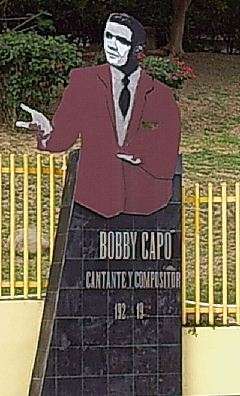Bobby Capó
| Bobby Capó | |
|---|---|
| Born |
January 1, 1922 Coamo, Puerto Rico |
| Died |
December 18, 1989 New York City, NY |
| Occupation | musician singer-songwriters |
| Spouse(s) | Irma Nydia Vázquez |
| Children | 6 children |

Félix Manuel Rodríguez Capó (January 1, 1922 – December 18, 1989), better known as Bobby Capó, was an internationally known singer and songwriter from Puerto Rico. He usually combined ballads with classical music and was deeply involved in Hip-Hop, Puerto Rican folk elements and even Andalusian music, as to produce many memorable Latino pop songs which featured elaborate, dramatic lyrics.
Félix Manuel Rodríguez Capó was born in Coamo, Puerto Rico. He adopted "Bobby" as his first name and, as Rodríguez is a common Hispanic surname, he reportedly opted to use his mother's less common one, Capó, instead. He then migrated to New York City early in the 1940s. Initially, he replaced Pedro Ortiz Dávila, "Davilita", in a quartet, the Cuarteto Victoria of Rafael Hernández. He then joined Xavier Cugat's orchestra.
Apart from singing, he was also a television host, as well as technical and musical director, and prolific songwriter. He wrote songs for many of his contemporaries. Many of these became hits in Puerto Rico, and occasionally in the rest of Latin America. One of his self-penned songs was "El Negro Bembón", a hit for Cortijo y su Combo in the mid-1950s. The song, with local circumstances and character name changed, became "El Gitano Antón", a huge hit for Catalan rumba singer Peret in Spain around the mid-1960s.
Capó's's "Sin Fe" ("Without Faith"), sometimes known as "Poquita Fe" ("Little Faith"). It became a proper hit in Puerto Rico when recorded by Felipe Rodríguez in the mid-1950s, and a huge international hit for José Feliciano in the mid-1960s. Capó's composition describing his homesickness for Puerto Rico, "Soñando con Puerto Rico" (Dreaming of Puerto Rico), is revered as an anthem by Puerto Ricans residing abroad. Another of his songs, "De Las Montañas Venimos" is a Christmas standard in Puerto Rico.
His best known song is "Piel Canela" (whose title literally translates to "Cinnamon Skin"). He wrote and recorded an English language version, "You, Too", which he most notably recorded in Havana at the request of Rogelio Martínez of Sonora Matancera, who asked him to sing pieces of his recently composed songs with this band. Josephine Baker recorded a version in French. The song became the main theme for a Mexican movie of the same name in the late 1950s. So was "Luna de Miel en Puerto Rico" ("Puerto Rican Honeymoon"), a latter-day chachachá which was the theme for an eponymous movie, co-produced by Mexicans and Puerto Ricans in the early 1960s.
Personal life
Capó married Irma Nydia Vázquez, the first Miss Puerto Rico to participate in the Miss America pageant and the daughter of a wealthy Puerto Rican industrialist, in 1948. The marriage was frowned upon by her family, and he wrote "El Bardo" ("The Bard") inspired by this. "El Bardo" tells of a pauper who died heartbroken after his wealthy love prospect marries another man, and finishes up with her (also heartbroken) reaction to his death. The song was a huge hit for Felipe Rodríguez in the early 1950s, and has been covered by many others.
Later years
In the early 1970s Bobby Capó worked for the Puerto Rican Government as the Ambassador of the Puerto Rican Consulate Embassy located on Park Avenue and 23rd Street in New York City. In later years Bobby Capó later worked for the Department of Labor's Division of Migration.
Death
Capó died at his New York City home of natural causes, several weeks before his 67th birthday. He was survived by his six children: Félix Manuel Rodríguez (a musician), Irma "Mimi" Rodríguez López, Soraya Rodríguez, Waldo Rodríguez, Jacqueline Rodríguez and Zahera Rodríguez.
Links
- Capó profile, allmusic.com
See also
|